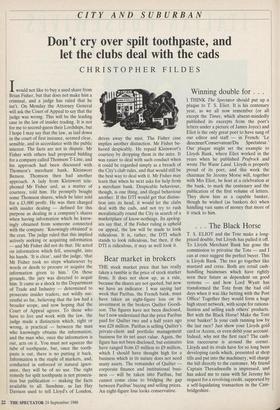CITY AND SUBURBAN
Don't cry over spilt toothpaste, and let the clubs deal with the cads
CHRISTOPHER FILDES
Iwould not like to buy a used share from Brian Fisher, but that does not make him a criminal, and a judge has ruled that he isn't. On Monday the Attorney General will ask the Court of Appeal to say that the judge was wrong. This will be the leading case in the law of insider trading. It is not for me to second-guess their Lordships, but I hope I may say that the law, as laid down in the court of first instance, seemed clear, sensible, and in accordance with the public interest. The facts are not in dispute. Mr Fisher with others had proposed bidding for a company called Thomson T-Line, and his approach had been discussed with Thomson's merchant bank, Kleinwort Benson. Thomson then had another approach. A lady from Kleinwort tele- phoned Mr Fisher and, as a matter of courtesy, told him. He promptly bought some Thomson shares, which he later sold for a £3,000 profit. He was then charged with insider dealing — defined for this purpose as dealing in a company's shares when having information which he know- ingly obtained from someone connected with the company. 'Knowingly obtained' is the crux. The judge ruled that this implied actively seeking or acquiring information — and Mr Fisher did not do that. He acted on information which fell, unsought, into his hands. 'It is clear', said the judge, 'that Mr Fisher took no steps whatsoever by words or deeds to procure or acquire the information given to him.' On those grounds, the jury was directed to acquit him. It came as a shock to the Department of Trade and Industry — determined to prosecute insider traders, not wildly suc- cessful so far, believing that the law had a broader scope, and now hoping that the Court of Appeal agrees. To those who have to live and work with the law, the judge made a distinction which, right or wrong, is practical — between the man who knowingly obtains the information, and the man who, once the information is out, acts on it. You must not squeeze the tube of toothpaste, but, once the tooth- paste is out, there is no putting it back. Information is the staple of markets, and, conducted in enforced or natural ignor- ance, they will be of no use. The right remedy for spilt toothpaste is not prosecu- tion but publication — making the facts available to all. Sunshine, as Ian Hay Davison used to tell Lloyd's of London,
drives away the mist. The Fisher case implies another distinction. Mr Fisher be- haved despicably. He repaid Kleinwort's courtesy by dropping them in the mire. It was easier to deal with such conduct when it could be regarded simply as a breach of the City's club rules, and that would still be the best way to deal with it. Mr Fisher may learn that when he next asks for help from a merchant bank. Despicable behaviour, though, is one thing, and illegal behaviour another. If the DTI would get that distinc- tion into its head, it would let the clubs deal with the cads, and not try to rush moralistically round the City in search of a marketplace of know-nothings. Its apolog- ists say that, if the Fisher ruling is upheld on appeal, the law will be made to look ridiculous. It is, rather, the DTI which stands to look ridiculous, but then, if the DTI is ridiculous, it may as well look it.






























































 Previous page
Previous page